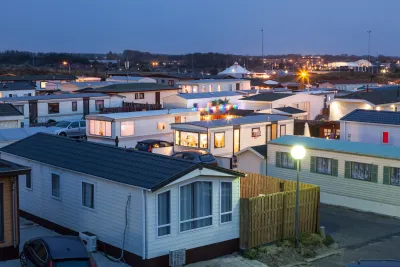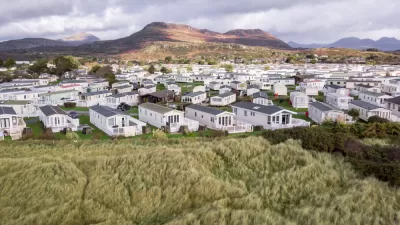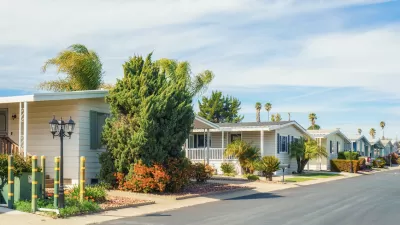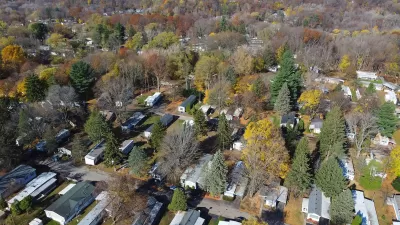Failing infrastructure, poor water and air quality, and predatory owners endanger the health of manufactured home residents, many of whom are elderly and low-income.

In addition to rising costs and threats of displacement, U.S. mobile home residents face “serious health hazards,” according to a new report from Human Impact Partners and advocacy group Manufactured Housing Action (MHAction).
As Hope Davis explains in an article in Next City, the report used tenant interviews, information from mobile home operator Homes for America, and public records to understand how poor infrastructure and deteriorating conditions put manufactured home residents at risk from extreme heat and cold, poor water quality, and unhealthy air. “In the report, researchers documented water quality violations at five Homes of America parks that included heavy metals, nitrates and fecal contaminants that could be linked to skin and gastrointestinal issues.”
Manufactured housing lacks the same legal protection as other residential rentals, in part because residents often own their home but lease the land. “These parks are often in rural places with few protections and house populations that are vulnerable to exploitation, such as low-income, elderly, disabled and immigrant tenants.”
The report offers recommendations that apply across the housing sector, including “strengthening housing standards and tenant protections, supporting community ownership and limiting corporate speculation.”
FULL STORY: Private Equity Is Turning Mobile Homes Into Health Hazards. What Can Governments Do?

Planetizen Federal Action Tracker
A weekly monitor of how Trump’s orders and actions are impacting planners and planning in America.

Vehicle-related Deaths Drop 29% in Richmond, VA
The seventh year of the city's Vision Zero strategy also cut the number of people killed in alcohol-related crashes by half.

As Trump Phases Out FEMA, Is It Time to Flee the Floodplains?
With less federal funding available for disaster relief efforts, the need to relocate at-risk communities is more urgent than ever.

Berkeley Approves ‘Middle Housing’ Ordinance
The city that invented single-family zoning is finally reckoning with its history of exclusion.

SEPTA Budget Slashes Service by 45 Percent
The Philadelphia-area transit agency is legally tasked with maintaining a balanced budget. Officials hope the state will come to the rescue with additional funding.

Connecticut Governor Vetoes Housing Bill
Gov. Lamont reversed his view on a controversial affordable housing bill that would have required municipalities to zone for set amounts of affordable housing to receive state funding.
Urban Design for Planners 1: Software Tools
This six-course series explores essential urban design concepts using open source software and equips planners with the tools they need to participate fully in the urban design process.
Planning for Universal Design
Learn the tools for implementing Universal Design in planning regulations.
Heyer Gruel & Associates PA
JM Goldson LLC
Custer County Colorado
City of Camden Redevelopment Agency
City of Astoria
Transportation Research & Education Center (TREC) at Portland State University
Camden Redevelopment Agency
City of Claremont
Municipality of Princeton (NJ)





























